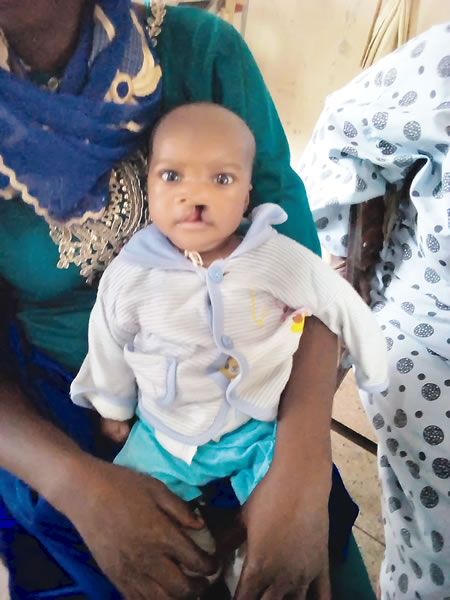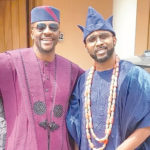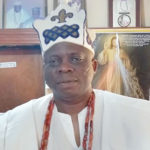Good gifts are ultimately valued and bundles of joy such as babies are eternally cherished. But for parents who have babies with deformities, the stories are often different. Babies that should have been welcomed with pomp and ceremony may well be wished away if they are physically challenged.
The situation of a young couple was laced with bitterness but it ended in joy. Mr Emmanuel Taiwo and his wife, Jumoke, had eagerly awaited the birth of their new baby but they got the shock of their lives three months ago when baby Grace arrived. She was born with cleft of the lips that left a hollow on her mouth.
Father and mother grieved and pondered on how to rid little Grace of the deformity which affected her upper and lower lips. But no respite came their way until they were referred to the University College Hospital (UCH), Ibadan, where the baby underwent surgery on Thursday, July 26.
Now, Mrs Taiwo heaves a sigh of relief as she checks her child after the surgery that lasted an hour. She recalled that it took her three other children (Grace’s siblings) a long time to come to terms with the fact that Grace was their sister and that they should show her love regardless of her condition.
She said she found it difficult to take her baby out in that state because she was afraid of being stigmatised by the people. According to her, she was reluctant to let people see her baby with cleft because many are of the notion that a child born with disability means bad luck. “Many people erroneously say that such a baby is in the family as a result of the parents’ past misdeeds,” she said.
Narrating her experience before her daughter had the plastic surgery, Mrs Taiwo, a pretty trader, said her joy was dampened when she realised that her baby had come with deformed lips. For three months, the mother of four said she lived in agony and embarrassment. “I had my baby at Oba Adeyemi Hospital, Oyo town. I was so sad to see that my baby was in that frightening shape. I decided that I needed immediate help but I really didn’t have a clear idea of what to do.
“From the first hospital, we went to Ayoola Hospital, Ilora, near Oyo town, to seek medical advice. We were told that the surgery would cost us N250,000. We could not afford such an amount but luckily, we were eventually given a referral letter to the University College Hospital, Ibadan.
“I felt so terrible about the situation and I decided that I could not be taking the baby about in that condition. At UCH, we were told to take the baby for check-up after which we were given a date (July 26, 2018) for the surgery. The surgery was done free; we did not incur any bill,” she said.
Asked how she felt about the outcome of the surgery, she said: “I am very happy now although initially I was sad and afraid to see that the baby was deformed. I was told that the surgery would not take long. It took an hour. Grace is my fourth child and I never had such experience before. My first child is Ibrahim, the second is Rukaya and the third is Moses. Apart from being deformed in the mouth, she did not manifest any other medical problem.”
She said Grace was well received by her siblings and they enjoyed playing together although they were initially shocked. Jumoke said she was glad that Emmanuel, her husband, gave her the necessary support and encouraged her with kind words.
Baby Grace went under the knife on Wednesday with deformed lips but came out of the theatre an hour after with a new facial profile. Mother and grandmother as well as other concerned family members jumped for joy as the three-month-old baby was wheeled out of the theatre after a successful surgery.
Like baby Grace, Dorcas Pascal, a mother of two, had her surgery at UCH on Monday. But while Grace had the surgery three months after birth, Pascal had lived with the cleft that deformed her lips for 20 tortuous years before she got help. According to her, the experience that she had for the period that she lived with cleft lips was sad. She said: “People would always mock me. Except when I was at home with my siblings – Johnson and Jacob – people were always mocking me and calling me names.
“I got to know about the free surgery through a woman called Iya Deji, a neighbour of mine that frequents Ibadan. I never thought that I could ever have a surgery to correct the problem on my lips. My children, Bose and Jacob, would be very glad to see me back home with normal lips. I am also happy and grateful to those who provided money for the free services. They have taken away my agony and I feel so indebted to them”.
Like Grace and Pascal, many other people across the globe had received a new lease of life with a plastic surgery that lasted between 45minutes and one hour. But not many of them could afford the estimated $250 cost of cleft surgery. With an average of 200,000 or more new babies with cleft born globally every year, the joy of many homes may have been punctured as deformity resulting from cleft signposts their lips or mouths. Some of them live with cleft of the mouth while more complicated cases affect the palate.
Cleft has been found to plague more children from poor backgrounds than children of the affluent. The challenges of getting a remedy for new born babies with cleft are daunting. In Nigeria, across Africa as well as India and other places with high prevalence of cleft, the intervention of Smile Train has been variously applauded.
Medical experts say that cleft occurs in the early stage of conception when a child is being formed in the womb. The head is formed before the other parts of human body but mothers are usually not aware of the risk of not getting necessary medical intervention during pregnancy.
A consultant plastic and reconstructive aesthetic surgeon at UCH, Ibadan, Dr Afieharo Michael, said: “You can call a cleft gap in the lips or in the roof of the mouth. Cleft affects the lips, the floor of the nose, the teeth as well as the bone of the upper jaw. Some are simple cleft that affects just the lips while others affect the upper roof of the mouth. Once a child is born with cleft that is the way it stays, it does not grow.
“Cleft does not have anything to do with hormones, there are number of causes that may be responsible. There are causes that have to do with the mother and there are causes that could be as a result of environment. The more common cause is folic acid deficiency. Smoking, drinking or use of medication for epilepsy or diabetes during pregnancy may be responsible.”
In some instances cleft could be genetic. Michael stated: “It is very possible that a child has it if a case had happened to someone in his bloodline, though this is not well defined. We always advise that pregnant women should not take drugs when not prescribed. Mothers should be taking folic acid before they conceive. The face is formed early in pregnancy even before the woman knows that she is pregnant. Most of our women don’t register at the clinic until when their children are five months old.
“Some women take a lot of concoction called ‘agbo abiwere’ that contains alcohol. This may be contributory to chances of giving birth to babies with cleft. Some women have infectious diseases. We make sure that is sorted out before they get pregnant”.
Despite the fact that self-medication is commoner in Nigeria and other developing countries, Michael said that cleft is commoner in India than Africa. She said: “There are number of cases in Nigeria but maybe we don’t have sufficient data. It is not in every situation that we find a definite cause for cleft. Research has not stated why it is commoner in India than Africa. UCH has between one to three new cases of cleft every two weeks”.
In the past 10 years, the surgeon said UCH had operated 300 patients with cleft cases. Of this number, only one case went wrong during surgery. Cost of surgery for cleft in Nigeria is between N70,000 and N150,000. Michael said a New York based non-governmental organization called Smile Train was partnering with UCH to help cleft patients correct the malformation.
Partnership between UCH and Smile Train has spanned 10years. An awareness programme in which key players in all the 33 local government councils of the state were involved was concluded barely two weeks ago. During the sensitization programme the stakeholders were encouraged to refer people with cleft cases to UCH. Smile Train has performed more than 300 cleft surgeries in Oyo Sate alone and more than one million cleft surgeries globally in since 1999.
As often experienced by those who are physically challenged in Nigeria and other developing countries of the world, people who have cleft are usually stigmatised with many of them loosing self-esteem. Dorcas, a Togolese who just had a correctional surgery for cleft of the lips, said that the operation would give her new life and put an end to rejection by the people. She lamented that those who have cleft are seen as less human, evil or suffering for the offense committed by their ancestors.







